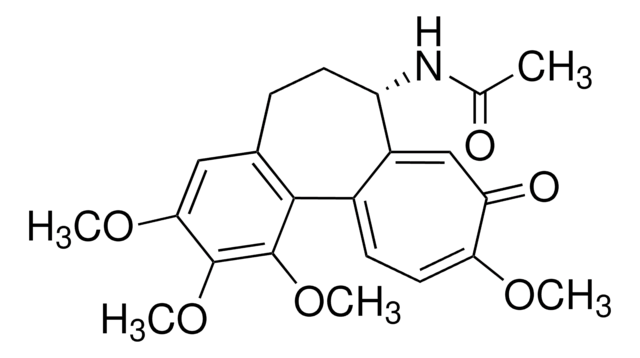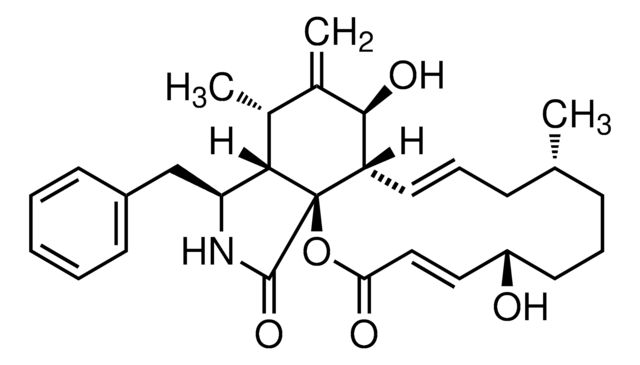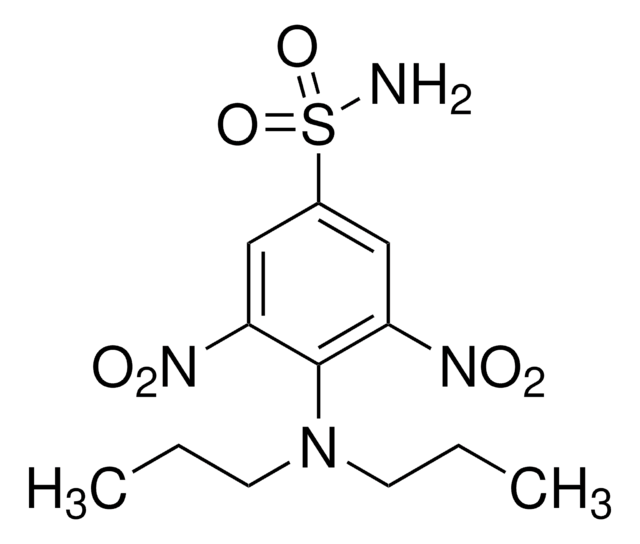234115
Colchicin, Colchicum autumnale
Colchicine, Colchicum autumnale, CAS 64-86-8, is an inhibitor of mitosis that disrupts microtubules and inhibits tubulin polymerization. Induces apoptosis in PC12 and cerebellar granule cells.
Synonym(e):
Colchicin, Colchicum autumnale
About This Item
Empfohlene Produkte
Qualitätsniveau
Assay
≥94% (HPLC)
Form
powder
Hersteller/Markenname
Calbiochem®
Lagerbedingungen
OK to freeze
protect from light
Farbe
yellow to off-white
Löslichkeit
ethanol: 10 mg/mL
water: soluble
Versandbedingung
ambient
Lagertemp.
10-30°C
InChI
1S/C22H25NO6/c1-12(24)23-16-8-6-13-10-19(27-3)21(28-4)22(29-5)20(13)14-7-9-18(26-2)17(25)11-15(14)16/h7,9-11,16H,6,8H2,1-5H3,(H,23,24)/t16-/m0/s1
InChIKey
IAKHMKGGTNLKSZ-INIZCTEOSA-N
Allgemeine Beschreibung
Biochem./physiol. Wirkung
Mitose-Inhibitor
Warnhinweis
Sonstige Hinweise
Lindenboim, L., et al. 1995. J. Neurochem.64, 1054.
Leung, M.F., and Sartorelli, A.C. 1992. Leuk. Res.16, 929.
Santell, L. 1992. Exp. Cell Res. 201, 358.
Salmon, E.D., et al. 1984. J. Cell Biol.99, 1066.
Rechtliche Hinweise
Signalwort
Danger
H-Sätze
Gefahreneinstufungen
Acute Tox. 2 Oral - Muta. 1B
Lagerklassenschlüssel
6.1A - Combustible acute toxic Cat. 1 and 2 / very toxic hazardous materials
WGK
WGK 3
Flammpunkt (°F)
Not applicable
Flammpunkt (°C)
Not applicable
Analysenzertifikate (COA)
Suchen Sie nach Analysenzertifikate (COA), indem Sie die Lot-/Chargennummer des Produkts eingeben. Lot- und Chargennummern sind auf dem Produktetikett hinter den Wörtern ‘Lot’ oder ‘Batch’ (Lot oder Charge) zu finden.
Besitzen Sie dieses Produkt bereits?
In der Dokumentenbibliothek finden Sie die Dokumentation zu den Produkten, die Sie kürzlich erworben haben.
Unser Team von Wissenschaftlern verfügt über Erfahrung in allen Forschungsbereichen einschließlich Life Science, Materialwissenschaften, chemischer Synthese, Chromatographie, Analytik und vielen mehr..
Setzen Sie sich mit dem technischen Dienst in Verbindung.




